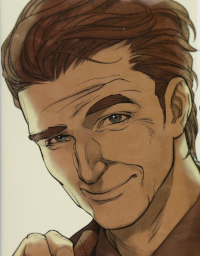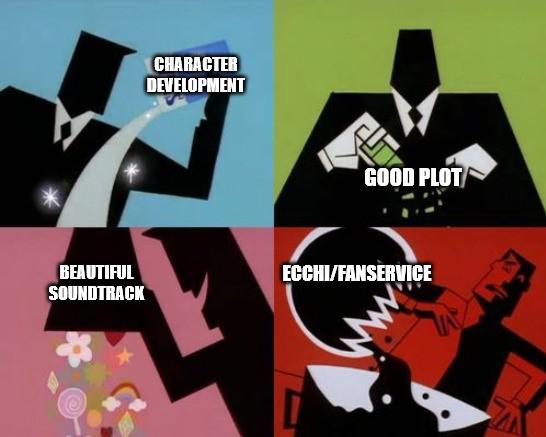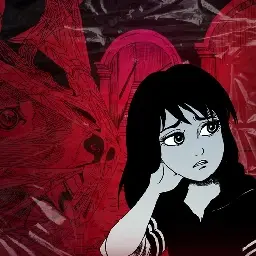Japanese title*: Shimanami Tasogare (しまなみ誰そ彼)
English title: Our Dreams at Dusk
Type: Manga
Year: 2015-2018
Country: Japan
Genre: Drama
Status: Completed (four volumes)
Platform: Seven Seas Entertainment published the series in English; old scanlations can also be easily found online
Appropriate for 30+?: Resounding yes
My rating: 5/5 stars
(Rating scale: 5/5 = masterpiece, 4/5 = quite good, 3/5 = mostly good, 2/5 = bleh, 1/5 = I regret ever being exposed to this series, 0/5 = affront to humanity)
*the title in Japanese has a double meaning, with "Shimanami" being a place name, and "tasogare" meaning "twilight" but it's spelled to loosely translate instead to "who is he?"
To preface: I almost never give out perfect 5/5 ratings, but Shimanami Tasogare is just that solid. It's a series I've read several times and adore for both general and personal reasons. I've written an unusually long review because there's just so much to unpack here. While there are no major spoilers ahead, if you trust my judgement stop reading this review and go read the series instead: I don't want to unnecessarily color your experience.
Shimanami Tasogare is a series of understated brilliance that does so many things well that it's difficult to know where to start dissecting it. I'll start with the subtlely beautiful art, which features just enough detail to be realistic yet a touch dream-like, and it confidently dips into the surreal to introduce brief, almost flow-of-consciousness moments for the purpose of conveying the characters' emotions in the moment (this is only one of many ways that the series excels at "show don't tell"). The setting is itself an integral part of the story, and is portrayed in a level of detail and specificity rarely seen in manga. Then there's the tone: while the series deals with serious topics and sad moments, it handles them with grace and skillfully maintains an overall uplifting and joyous vibe (which I really appreciated, as I rather dislike "I smiled through the tears!" or "orphan-crushing machine" stories that are billed as "bittersweet" or "heartwarming," although be forewarned some characters' plotlines are more tragic than others, and the emotional impact of each plotline will almost certainly differ from reader to reader depending on whether it hits close to home or not).
One of the series' greatest strengths is in the characters, every one of which is complex, imperfect, sympathetic, interesting, and above all human. While the protagonist is a high school boy, the supporting cast range from approximately age 11 to 60, with most in their 20s/30s, and about an even gender split. You could argue this is a coming of age story, however the high school plotline is portrayed with maturity, and the older characters all get their own fully-fleshed-out plotlines too, so I think the more generic "character drama" label is much more appropriate. Characters' reactions are not always immediately understood by the audience, but they never feel arbitrary, like they came out of nowhere, or merely happened for the sake of plot development. The characters always drive the plot, never the other way around.
Speaking of the plot, while far from an "edge-of-your-seat" series, the plot is quite engaging, and barreling through the entire four-volume series in one sitting is far from unthinkable. The pacing is fantastic, much of which is thanks to the series' excellence in "show don't tell": the dialogue never feels excessive nor insufficient, and the author conveys characters' thoughts and emotions via art, expression, and action as much as via dialogue. This leads to scenes that squeeze a lot of development into just a few panels, but it never feels rushed or confusing.
Two details that made me personally love the manga even more are: (1) the series is set along the "Shimanami Kaido," which as mentioned in the manga is a historic area of central Japan made up of a series of islands connected by a long highway that also features a fantastic cycling route that I've ridden myself (if you ever visit Japan and are capable of riding a bike, rent yourself a cheap mama-chari and ride as much of the route as you physically can). (2) The characters are involved with a non-profit that renovates old abandoned houses ("akiya") and repurposes them; I love old stuff and there's something so romantic and enticing about both the slow-decline vibe of abandoned houses in depopulated areas and the magic of "restoring something old to its former glory" renovation projects. While neither the Shimanami area nor the akiya restoration project are the focus of the series, they are explored in a good amount of detail and the reader should walk away from the series having learned something about both.
Now that I've sufficiently buried the lede, it's time to discuss probably the most noteworthy elements of Shimanami Tasogare, which is that it's possibly one of the best LGBTQ+ manga ever written; it certainly was groundbreaking in the mid-2010s when it was released for its realistic depiction of LGBTQ+ issues in Japan. However! Much like how the series feels relevant and highly accessible even to readers much older than the adolescent protagonist, Shimanami Tasogare is far from a manga only for LGBTQ readers. In fact, I'd strongly argue that everyone regardless of sexual/gender orientation should read this manga, not only for all the series' fantastic qualities I listed above, but also for its poignant messaging about intentional and unintentional homo/transphobia and what it means to be a supportive ally. I would go so far as to wish it were required reading in every middle school in the US, up there with other cultural touchstones like To Kill a Mockingbird, because it covers a lot of "culture war" issues (both in relation to LGBTQ+ issues and otherwise) in a compassionate, clear, and concise way while somehow never feeling preachy. Full disclaimer: I do not consider myself a member of the LGBTQ+ community, and thus this review is from the perspective of an ally. However my understanding is that the manga received rave reviews from LGBTQ+ communities in Japan and abroad, so I feel confident in my positive assessment of the series.
As just one example of effective messaging, the series clearly demonstrates the value and importance of "safe spaces" (both IRL and digital) for marginalized populations, and what can happen when they're invaded, even if it's with good intentions. One of the supporting characters is a pushy and opinionated straight/cis woman who takes it upon herself to white knight for her trans friend and repeatedly oversteps her bounds until she's finally told off and sheepishly retreats to the literal background for the remainder of the series. No one ever comes out and explains that "a true ally is someone who knows when to step up and when to step back," but anyone with a touch of reading comprehension will hear this message loud and clear.
This is how almost all messaging in the series is: rarely stated directly, but portrayed so clearly that anyone with a shred of compassion or sympathy will understand them. I've considered myself an ally of the LGBTQ+ community for over twenty years, and have read many explanations on microaggressions, safe spaces, the importance of allyship, "the queer experience," etc. (in addition to similar pieces related to other marginalized groups, such as racial/ethnic/religious minorities). Rarely have I read a more clear, convincing, and more importantly precise and concise argument for so many concepts often dismissed as "libtard bullshit." I think this is a case of using a medium to its full potential: the graphic novel format allows the author to portray a lot of concepts non-verbally, which better allows the reader to feel like they've been able to observe the situation for themselves and thus draw their own conclusions, while simultaneously avoiding the inherent "preachiness" of verbal communication. The author never needs to state "don't do X, because it will make people feel bad," because the reader can instead watch X unfold, then infer for themselves that it made a character feel bad based on their expression and body language. This technique only works because every character and every situation feels so realistic, especially in relation to each other, which is why it's critical that so many other elements of the manga are as solid as they are.
Another testament to how successful the author is at conveying difficult messages in a positive and effective way is in how the manga has aged: usually with quickly-evolving cultural topics (such as LGBTQ+ issues) there's almost always something that even expert creators get wrong, that feels outdated even only a few years later, that comes off as misguided, divisive, controversial, or offensive. The stronger the messaging the more likely these blunders are to occur, and Shimanami Tasogare definitely has some strong messaging. Now perhaps there's something that I overlooked or missed that someone from the LGBTQ+ community would identify as a misstep on the part of the author. However I think the author did a brilliant thing to avoid this when crafting their messaging: they portray imperfect characters that are often conflicted and uncertain of what they should do, characters that cause hurt and feel hurt even when no ill will was intended. Further, and as outlined above, the author avoids preachy dialogue that declares absolute truths by instead utilizing "show don't tell." After all images are inherently more nuanced messengers than words (there are a few moments where characters do have to spell things out for each other, but the messaging is usually either extremely general or portrayed as just their opinion, and is always plot-relevant and never feels ham-fisted or forced). One of the central themes of the series is the difficulties people inevitably have understanding each other, often even themselves, and how this unfortunately leads to people hurting one another even when they're trying to help or do the right thing. Yet the series is generally positive about society and humanity as a whole, and would fit right in with the "it gets better" campaign. This all further helps the series feel nuanced, as if to assure the reader, "no one can always get it right (not even me the author) and that's okay."
In summary: Shimanami Tasogare is a story about people (LGBTQ+ or otherwise) and their relationships with themselves, other individuals, and society as a whole. It is brilliantly composed, with exemplary art, pacing, plot, dialogue, setting, and characters. It is smart but accessible, with timeless themes about human relationships that are also painfully relevant to contemporary issues, and it conveys poignant messaging without soapboxing. A core theme of Shimanami Tasogare is that your sexual/gender identity is part of you not all of you, and the same should be said for this manga: while it is a story that covers LGBTQ+ issues, it is far from being just an LGBTQ+ work. I highly recommend this series to everyone, regardless of age,* nationality, or gender/sexual identity.
*Given the nuanced and sometimes difficult content discussed, some discretion is advised. I'd give it a 12+ age rating, although it may resonate better with audiences 14+.



Red states are not okay, because all they have left in their value system is cruelty toward people they see as not "pulling their weight," as if we still live in some resource-scarce era of yore where if you don't work, you don't eat (and even if you do work, eating is not guaranteed, better work harder!).
Blue states are increasingly providing lunches, and sometimes even breakfast, for all students free of charge. It used to be income-based (you'd get free or half-priced lunch based on your family's income), but even that system is getting ditched because of the associated stigma and the problem of some needy students falling between the cracks.